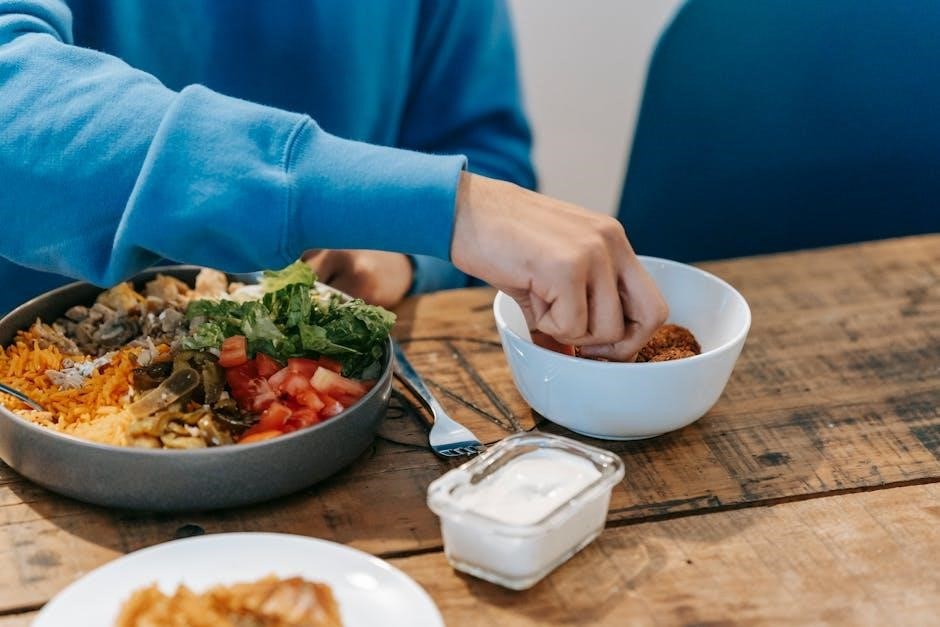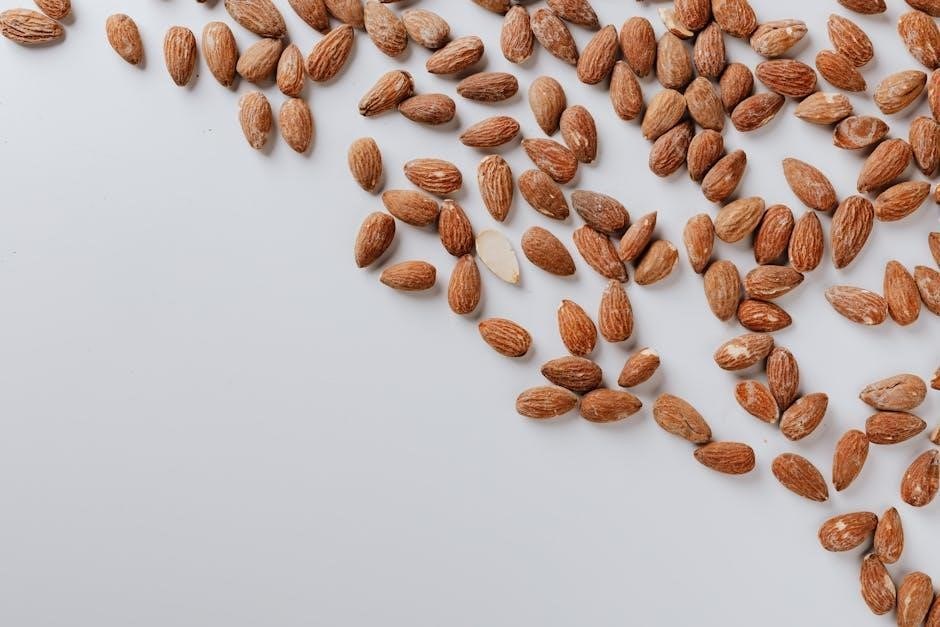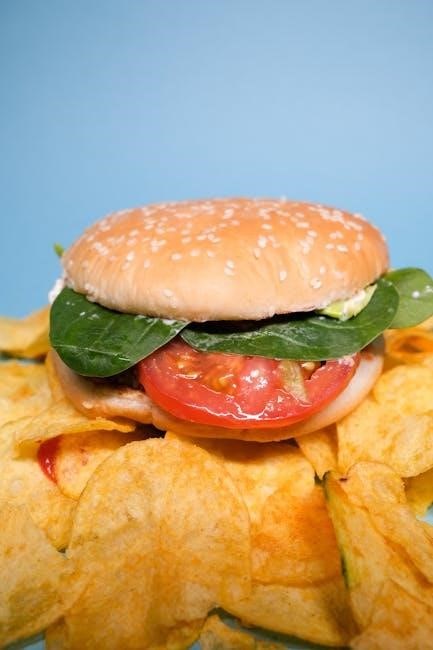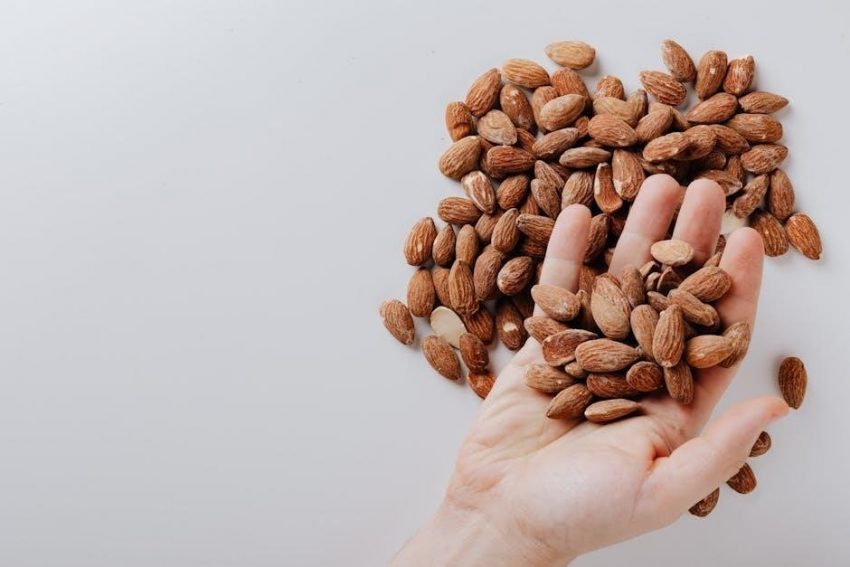Welcome to the 1400 Calorie Meal Plan, a structured approach to weight loss through balanced nutrition. This plan offers a daily intake of 1400 calories, designed to promote steady weight loss while maintaining muscle mass. With a focus on whole, nutrient-dense foods, it provides flexibility and variety to keep your diet engaging. Perfect for those seeking a sustainable path to a healthier lifestyle.
Overview of the Plan
The 1400 Calorie Meal Plan is a structured diet designed to support weight loss while maintaining overall health. It focuses on balanced nutrition, with a macronutrient distribution of 40% carbohydrates, 30% protein, and 30% fats. The plan includes three main meals and snacks, ensuring variety and satisfaction. It emphasizes whole, nutrient-dense foods like lean proteins, vegetables, and whole grains. This approach helps create a calorie deficit for fat loss while preserving muscle mass, making it suitable for those seeking sustainable weight management.
Benefits of a 1400 Calorie Diet for Weight Loss
A 1400 calorie diet creates a sustainable calorie deficit, promoting steady weight loss while preserving muscle mass. It balances macronutrients (40% carbs, 30% protein, 30% fats) to keep you full and energized. This plan supports fat loss without extreme hunger, making it easier to adhere to long-term. The focus on whole, nutrient-dense foods ensures proper nutrition and reduces cravings; Ideal for those seeking gradual, healthy weight loss without sacrificing dietary satisfaction or overall well-being.

Structure of the 1400 Calorie Meal Plan
The plan is organized into balanced meals and snacks, ensuring a daily intake of 1400 calories. It focuses on balanced nutrition and macronutrient distribution for steady weight loss and overall health.
Daily Meal Breakdown
The 1400 calorie meal plan is divided into breakfast, lunch, dinner, and snacks, ensuring a balanced intake of nutrients throughout the day. Breakfast typically consists of 280 calories, lunch 400, dinner 400, and snacks 520, totaling 1400 calories. Each meal is designed to include protein, healthy fats, and complex carbohydrates to keep you full and energized. This structured approach helps maintain metabolism and supports steady weight loss while providing essential vitamins and minerals for overall health and well-being.
Macronutrient Distribution
The 1400 calorie meal plan emphasizes a balanced macronutrient distribution, typically consisting of 40% carbohydrates, 30% protein, and 30% fat. This ratio supports fat loss while preserving muscle mass. Carbohydrates provide energy, protein aids in muscle repair, and fats contribute to hormone production. Fiber intake is also prioritized at 25-30 grams daily to enhance satiety and digestive health, ensuring a nutrient-dense and satisfying diet that promotes overall well-being and sustainable weight loss.
Importance of Balanced Nutrition
A balanced diet is crucial for overall health and weight loss success. The 1400 calorie meal plan ensures adequate intake of essential vitamins, minerals, and fiber, preventing nutrient deficiencies. Balanced meals stabilize energy levels, reducing cravings and overeating. By incorporating protein, healthy fats, and complex carbohydrates, this plan supports long-term sustainability and satisfaction, making it easier to adhere to the diet while maintaining physical and mental well-being.
7-Day Sample Menu
Discover a pre-planned 7-day menu with delicious, nutritious meals designed to support your weight loss goals. Each day includes balanced breakfast, lunch, dinner, and snack options.
Breakfast Options
Start your day with nutrient-rich breakfasts like Greek yogurt with berries, scrambled eggs with spinach, or oatmeal topped with nuts. These options balance protein, fiber, and healthy fats. A 50g serving of extra-fruit muesli with low-fat yogurt or a cup of non-fat Greek yogurt with fresh fruit offers a satisfying start. For protein lovers, a 3-egg omelet with veggies provides sustained energy. These meals keep calories in check while fueling your morning, supporting weight loss and muscle maintenance.
Lunch Ideas
Enjoy satisfying lunches with options like grilled chicken salad, whole-grain wraps, or vegetable stir-fries. A 3 oz. portion of low-fat ham, paired with low-fat cheese and lettuce, makes a light yet filling meal. Alternatively, a mixed green salad with lean turkey, cherry tomatoes, and a light vinaigrette provides balanced nutrition. These meals are portion-controlled, keeping calories in check while offering essential nutrients to support energy levels and weight loss goals throughout the day.
Dinner Recipes
Delicious and nutritious dinner options include baked salmon with roasted vegetables, totaling 350 calories, or grilled chicken breast with quinoa and steamed broccoli, around 320 calories. A stir-fry with lean beef, mixed vegetables, and brown rice offers balanced macros and flavors. These recipes are designed to keep you satisfied while staying within your daily calorie goal, ensuring a healthy and enjoyable weight loss journey.
Snack Suggestions
Healthy snacks are essential for curbing hunger and maintaining energy levels. Opt for options like a small apple with almond butter (150 calories), a handful of mixed nuts (160 calories), or Greek yogurt with berries (120 calories). Baby carrots with hummus (100 calories) and hard-boiled eggs (78 calories) are also great choices. These snacks are nutritious, low in calories, and help keep you satisfied between meals, supporting your weight loss goals without compromising your diet plan.

Grocery List and Meal Prepping
Stock up on lean proteins, fresh vegetables, whole grains, and healthy fats. Meal prep by portioning meals and snacks in advance to save time and ensure consistency.
Essential Items to Purchase
Stock up on lean proteins like chicken, fish, tofu, and legumes. Include healthy fats such as avocados, nuts, and olive oil. Whole grains like quinoa, oats, and brown rice are staples. Fresh fruits (berries, citrus) and vegetables (leafy greens, cruciferous) are vital. Dairy or dairy alternatives, eggs, and low-calorie snacks like Greek yogurt and seeds should be on your list. Herbs, spices, and vinegar add flavor without extra calories, ensuring meals stay nutritious and delicious while supporting your weight loss goals.
Meal Prep Tips for Sustainability
Plan your meals weekly and shop accordingly to avoid waste. Use airtight containers to store prepped meals, keeping them fresh for up to 3-4 days. Label and date containers for easy identification. Portion meals in advance to streamline daily routines. Freeze items like proteins, vegetables, and cooked grains for longer shelf life. Prep snacks and salads in bulk to save time. Cook proteins and grains in large batches for efficient meal assembly throughout the week.

Tips for Adhering to the Plan
Track your progress daily, stay hydrated, and eat mindfully. Avoid distractions while eating and include protein in every meal. Plan weekly and celebrate small victories.
Portion Control and Tracking
Accurate portion control is crucial for staying within your calorie goals. Use measuring cups or a food scale to gauge serving sizes. Track your daily intake with a food diary or an app to ensure you don’t exceed 1400 calories. Avoid eating straight from packages to prevent overeating. Regularly weigh yourself and adjust portions as needed to maintain progress. Consistent tracking helps identify patterns and keeps you accountable for your weight loss journey.
Avoiding Common Mistakes
Avoiding common mistakes is essential for the success of your 1400 calorie meal plan. Overeating, skipping meals, and poor food choices can derail progress. Stay hydrated, as thirst is often mistaken for hunger. Don’t rely on processed foods; focus on whole, nutrient-dense options. Meal prepping helps maintain consistency and prevents impulsive eating. Regularly review your plan to avoid plateaus and adjust portions or calorie intake as needed. Consistency and mindfulness are key to achieving your weight loss goals effectively.

High-Protein Options
Incorporating high-protein foods into your 1400 calorie meal plan supports muscle maintenance and satiety. Opt for lean meats, fish, eggs, tofu, and legumes to meet your protein goals effectively.
Protein-Rich Breakfast Ideas
Start your day with protein-packed breakfasts to boost metabolism and satisfaction. Greek yogurt with berries, scrambled eggs with spinach, or cottage cheese with fruit are excellent choices. A protein smoothie with whey powder, almond milk, and chia seeds also provides a nutrient-rich start. These options keep you full longer, supporting muscle maintenance and reducing hunger throughout the morning. Incorporate these ideas into your 1400-calorie meal plan for a strong and healthy beginning to your day.
High-Protein Lunch and Dinner Recipes
For satisfying meals, try grilled chicken salads with avocado, turkey lettuce wraps, or baked salmon with quinoa. These recipes are rich in protein and low in calories, fitting perfectly into your 1400-calorie plan. Incorporate lean meats, fish, and legumes to maintain muscle mass while promoting weight loss. Pair with vegetables and whole grains for balanced nutrition. Portion control ensures meals stay within your daily calorie goals, keeping you full and energized throughout the day.

Customization and Flexibility
Personalize your 1400-calorie plan by adjusting portion sizes and ingredient swaps to suit your tastes and dietary preferences; Easily incorporate cultural dishes for variety and sustainability;
Adjusting the Plan for Individual Needs
Tailor the 1400-calorie plan to fit your preferences and lifestyle. Swap ingredients, adjust portion sizes, or modify macronutrient ratios to meet specific dietary needs. Incorporate cultural dishes or personal favorites to keep meals enjoyable. For those with unique requirements, such as higher protein intake or vegetarian options, the plan can be adapted while maintaining calorie goals. Consulting a dietitian ensures personalized adjustments for optimal results and sustainability.
Incorporating Cultural or Dietary Preferences
The 1400-calorie meal plan is versatile, allowing seamless integration of cultural or dietary preferences. Whether you follow a vegetarian, vegan, or gluten-free diet, the plan can be adapted to suit your needs. Incorporate traditional dishes from global cuisines, such as Indian or Mediterranean meals, while maintaining nutritional balance. High-protein, low-carb, or other specific dietary requirements can also be accommodated, ensuring the plan stays diverse and enjoyable. This flexibility makes it easier to adhere to while respecting personal preferences and cultural flavors.

Common Concerns and Solutions
Addressing hunger and cravings while maintaining muscle mass is achievable with balanced nutrition, portion tracking, and high-protein options, ensuring sustained weight loss without compromising overall health or satisfaction.
Addressing Hunger and Cravings
Hunger and cravings can be managed by incorporating high-fiber, high-protein foods and healthy fats into meals. Eating smaller, frequent meals throughout the day helps maintain satiety and prevents overeating. Staying hydrated is also crucial, as thirst is often mistaken for hunger. Snacking on nutrient-dense options like fruits, nuts, or yogurt can curb cravings without exceeding calorie limits. Balancing macronutrients ensures long-lasting fullness, making it easier to adhere to the 1400-calorie plan while satisfying nutritional needs.
Maintaining Muscle Mass on a Calorie-Deficit Diet
Maintaining muscle mass on a 1400-calorie diet requires careful attention to protein intake and overall nutrition. Prioritize high-protein foods like lean meats, fish, eggs, and legumes to preserve muscle tissue. Regular strength training and resistance exercises also play a crucial role. Ensure meals are balanced with complex carbs and healthy fats to fuel muscle function. A macronutrient distribution of 40% protein, 30% carbs, and 30% fats can help maintain muscle mass while promoting fat loss. Consistency and patience are key to achieving this balance effectively.
The 1400 calorie meal plan is a practical and effective approach to weight loss, offering balanced nutrition and flexibility. By focusing on whole foods, portion control, and adequate protein intake, it supports fat loss while preserving muscle mass. Consistency and adherence are key to achieving and maintaining results. This plan serves as a valuable guide for those seeking a structured yet sustainable path to a healthier lifestyle, making weight loss manageable and achievable with dedication and the right tools.

